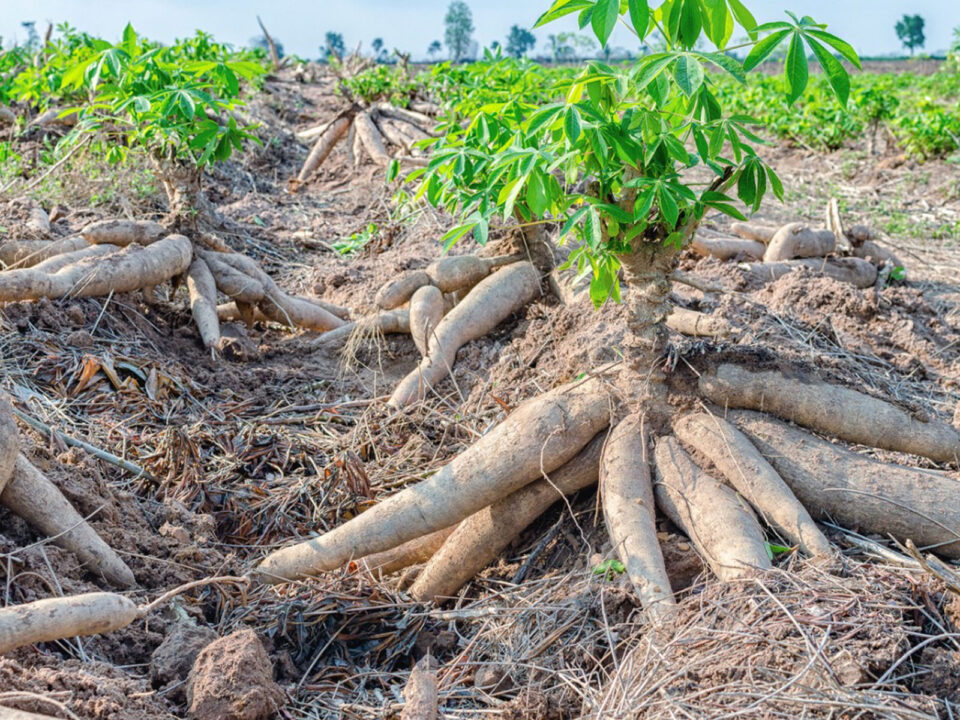By Kelvin Gilbert
The Memorandum of Understanding (MoU) signed by the Nigeria Cassava Growers Association and Large-Scale Cassava Processors and which was initiated by the Governor of Central Bank of Nigeria (CBN), Godwin Emefiele, was an article of faith designed to guarantee steady off-take and processing of cassava in Nigeria.
It was intended to consolidate the gains of earlier efforts which in the words of one of the key players in that agriculture sub-sector and Managing Director/Chief Executive Officer, Harvestfield Industries Limited, Prince Martins Awofisayo, revolutionised cassava production in Nigeria. He also attributed the transformation in cassava production in the country to the intervention of the Central Bank of Nigeria (CBN). He was emphatic in his assessment of the role of the CBN in the cassava sub-sector.
According to him, the CBN interventions in agriculture have made farmers’ associations become more organised, structured and committed than ever before. Specifically, he averred that through the Commercial Agricultural Credit Scheme (CACS), many companies like his decided to embark on backward integration after being a major importer of agrochemicals for over 15 years. Even more importantly, that decision was part of a desire to support the vision of the Federal Government and that of the CBN on “produce in Nigeria what we consume and consume what we produce in Nigeria.”
As part of the fulfillment of the agriculture policy which is to create employment and empower the rural folk, Awofisayo claims that his was a success story. “Our factory currently employs over 800 direct workers and over 10,000 indirect workers through our value chain nationwide. We have over 15,000 dealers and retailers including 27 warehouses nationwide,” he said.
It is important to note that resuscitating the cassava value chain in Nigeria has put the country on the world map as far as cassava production is concerned. Available record indicate that cassava is currently the fourth most important food crop in the world, after maize, wheat and rice and is grown on over 24 million hectares in 105 countries in the world with Nigeria as the leading producer.
It is without gainsaying it that Cassava represents one of the most important economic crops in the world. The world market for the commodity is one of the most dynamic with the volume of production and foreign trade growing steadily. Nigeria, as the largest producer, produced about 53 million metric tonnes (MT) in 2018 but with a very low average yield of about 7.7 metric tonnes per hectare as compared to 23.4 MT and 22.2 MT per hectare in Indonesia and Thailand respectively.
Before the CBN intervention, available statistics indicate that out of the 53 million MT of cassava produced in Nigeria annually; more than 90 per cent is processed into food for human consumption whereas a significant industrial demand exists for the output of processed cassava, primarily as substitute for imported raw materials and semi-finished products.
This should not come as a surprise to anyone familiar with the cultural understanding of agriculture as a way of life instead of a business enterprise that ought to be nurtured and managed for it to be able to contribute its quota to the nation’s economy. This was the driving force behind the CBN’s policy that set out to stress value chain benefits in all the agricultural crops be they rice, maize, wheat, cotton, oil palm and now cassava. The cassava value chain has enormous potential for employing over two million people in Nigeria if well harnessed, due to the diverse secondary products that it offers.
This move by the CBN to make agriculture a business endeavour was in itself influenced by the determination to diversify the economy away from oil and gas. It is the firm belief of the apex bank that the diversification of the economy is an essential tool for national development.
To this extent, therefore, the CBN is leaving no stone unturned towards repositioning Nigeria on the map of the world not just as the leading cassava producer but a processor as well. Without doubt, the nation is blessed with several varieties of cassava that can be explored to optimum potential. However, and even at that, there is need to adopt improved varieties and practices that would guarantee better yield, better processing efficiency, increased profit and improved standard of living for the farmers.
To enable it to achieve this goal, the CBN under Emefiele is not restricting itself to just financial interventions as it has continued to hold consultations with research centres such as the International Institute for Tropical Agriculture (IITA), Ibadan, Oyo state and the National Root Crops Research Institute, Umudike, Abia state. This is yielding good results as can be testified to by the farmers themselves if the improved yield per hectare since the CBN intervention is anything to go by.
Until recently, Nigeria was a net importer of cassava derivatives with its drain on the nation’s foreign reserve. This is gradually being reversed. Furthermore, increasing cassava production is a necessity as starch, glucose, sorbitol and other products currently being imported proffers no future for the nation in the long-term, in view of the fact that Nigeria imports cassava derivatives valued at over $600m annually.
The cassava sub-sector deserves all the investment it is presently getting from the CBN. It is a policy thrust that will close the gap in the demand and supply of the product and its derivatives. For instance, the demand for high quality cassava flour in bread, biscuits and snacks is above 500,000 tonnes annually while supply is below 15,000 tonnes; demand for cassava starch is above 300,000 tonnes annually while supply is below 10,000 tonnes; demand for cassava-based constituents in sugar syrup is above 350,000 tonnes annually while supply is almost nonexistent.
Similarly, the potential demand for ethanol in Nigeria as a fuel for cooking, to power vehicles (E10), and other industrial uses exceeds one billion litres, while production is nearly zero. It is from this perspective that it begins to make real sense why the CBN included cassava in the foreign exchange exclusion list to salvage the industry, encourage farmers to go back to their farms to boost job creation, increase output and improve the capacity utilisation of the processing companies.
It is also important to point out that though huge investments were made into the industry during the cassava bread initiative, the industry continues to suffer as a result of low yield varieties, poor farm practices, lack of good quality farm inputs, non-utilisation of available cultivable lands, manual system of production, inadequate funding for small holder out grower schemes and low processing capacity.
It is gratifying to observe that the CBN is aware of these shortfalls in the sub-sector. It is even more encouraging that the Bank has moved in to ameliorate these challenges through a complete value chain approach. That involves support to the Nigeria cassava growers’ association at the production level under the ‘Anchor Borrowers’ Programme (’ABP) and support to large scale cassava processors under the CACS and DCRR programs.
Added to this approach is the CBN’s collaboration with the private sector, State Governments in Nigeria’s cassava producing areas and other stakeholders to join hands towards resuscitating the cassava sector. This approach is to bring all stakeholders together so as to agree on a framework for modern production and processing of cassava by ensuring that everyone identifies and tackles all major challenges in the value chain from seedlings production, land clearing, planting, harvesting, processing, marketing and provision of extension services among others.
*Gilbert is an Abuja-based economic analyst



